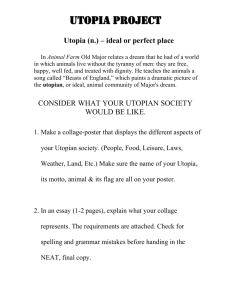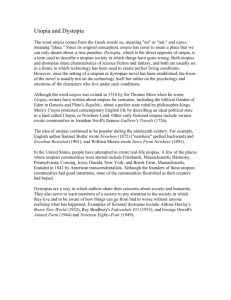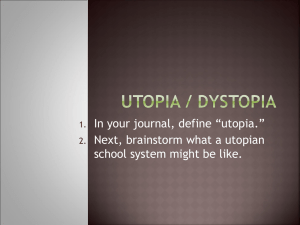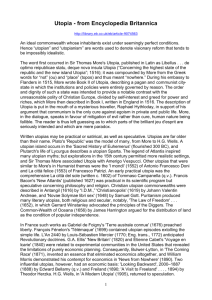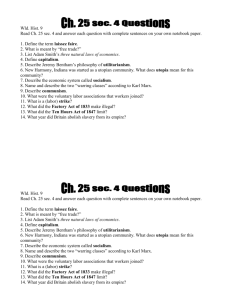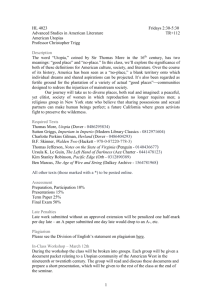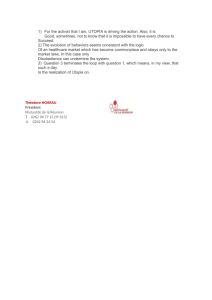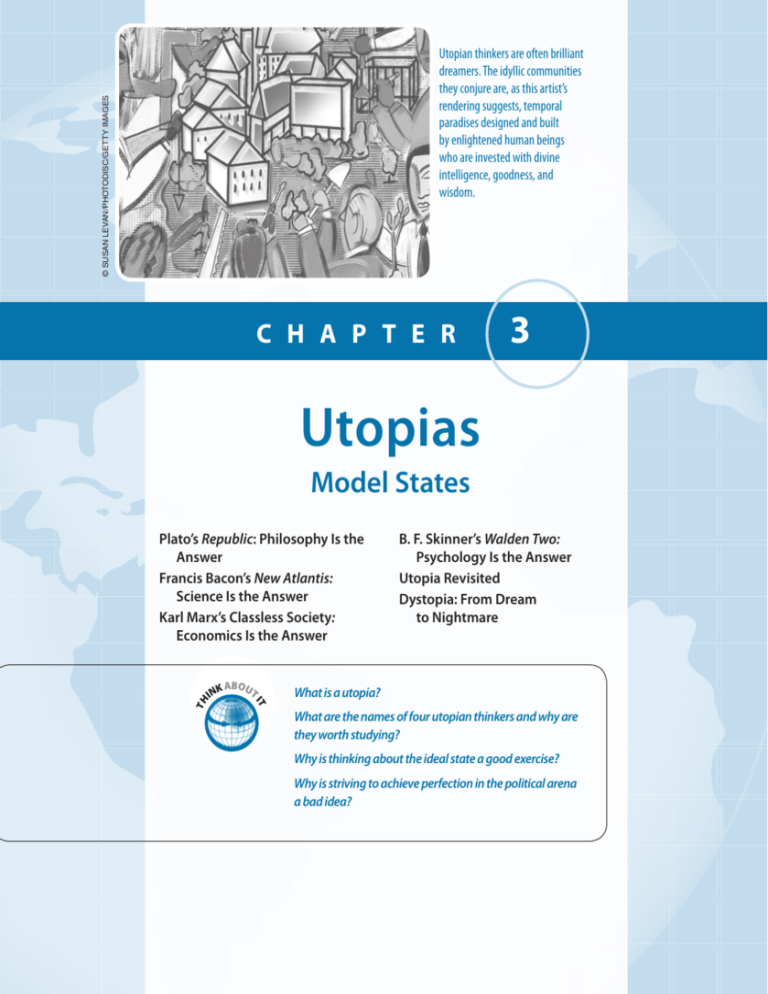
© SUSAN LEVAN/PHOTODISC/GETTY IMAGES
Utopian thinkers are often brilliant
dreamers. The idyllic communities
they conjure are, as this artist’s
rendering suggests, temporal
paradises designed and built
by enlightened human beings
who are invested with divine
intelligence, goodness, and
wisdom.
C H A P T E R
3
Utopias
Model States
K ABOUT
IN
IT
TH
Plato’s Republic: Philosophy Is the
Answer
Francis Bacon’s New Atlantis:
Science Is the Answer
Karl Marx’s Classless Society:
Economics Is the Answer
B. F. Skinner’s Walden Two:
Psychology Is the Answer
Utopia Revisited
Dystopia: From Dream
to Nightmare
What is a utopia?
What are the names of four utopian thinkers and why are
they worth studying?
Why is thinking about the ideal state a good exercise?
Why is striving to achieve perfection in the political arena
a bad idea?
Plato’s Republic: Philosophy is the Answer
43
W
hat constitutes the public good and the good society?1 To make meaningful comparisons between or among political systems, we first have
to clarify what the public good is and is not. Ideas about utopia found
in the writings of philosophers, theologians, and novelists give us a glimpse of
the possibilities, of what the best society the imagination can conjure might
look like. Imagining the best society leads inevitably to politics: What kind of a
government would such a society have? Would a perfect society have any need
for government? If politics is all about settling differences without violence,
perhaps a society without conflict would be altogether apolitical.
The study of utopia raises questions about the limits of politics, about the
very possibility of rising above politics. Perhaps there is wisdom in the adage
that says “the best is the enemy of the good.” History tells us that striving for
too much can be as bad as—or, in extreme cases, far worse than—settling for
too little.
The word utopia comes from the title of a book written by Sir Thomas
More (1478–1535), the lord chancellor of England under King Henry VIII and
an influential humanist. More coined the word from the Greek terms ou topos,
meaning “no place,” and eutopos, “a place where all is well.” Hence, we might
say that a utopia is a nonexistent place where people dwell in perfect health,
harmony, and happiness.
The literature of Western political philosophy contains a number of elaborate utopian blueprints, each of which represents some thinker’s best attempt
at imagining the best political order. Thinking about a utopian society leads
inexorably toward a critical examination of one’s own society and gives us
criteria for judging how well we measure up to the ideal. What it often fails to
do is tell us how to get there or what dangers and sacrifices we might encounter
along the way.
The American people are famous for taking a practical, no-nonsense,
problem-solving approach to life. Starry-eyed idealism is for others. And yet, there
have in fact been utopian experiments attempted in the United States. In 1826,
for example, British industrialist Robert Owen attempted just such an experiment at New Harmony, Indiana. The experiment lasted only two years. Owen’s
son offered this colorful description of New Harmony society that hints at one
reason why it failed: “a heterogeneous collection of radicals . . . honest latitudinarians, and lazy theorists, with a sprinkling of unprincipled sharpers thrown in.”
Our exploration of famous utopias begins with Plato’s Republic, which we
contrast with three later versions of utopia—Sir Francis Bacon’s New Atlantis,
Karl Marx’s “classless society,” and B. F. Skinner’s Walden Two. Each author
finds answers in a different place. For Plato, the answer lies in the realm of
philosophy; for Bacon, in science; for Marx, in economics; and for Skinner, in
psychology.
There are many other noteworthy examples of utopian literature, including
More’s Utopia (1516) and U.S. writer Edward Bellamy’s Looking Backward,
2000–1887 (1888). There is also a fascinating body of literature on dystopia—
well-intended political experiments that went terribly wrong. The purpose of
these works, which we review at the end of the chapter, is to demonstrate the
danger of trying to build a perfect order in an imperfect world.
utopia
Any visionary
system embodying
perfect political and
social order.
44
CHAPTER 3
Utopias
PLATO’S REPUBLIC: PHILOSOPHY
IS THE ANSWER
Plato’s Republic takes the form of a long dialogue between Socrates (c. 470–399
BCE) and several real or imaginary participants. Socrates, considered the first
Western political philosopher, held that “the unexamined life is a life not worth
living,” an idea that has become a cornerstone of Western civilization. As portrayed by Plato (c. 428–348 BCE), Socrates’ most brilliant student, Socratic
philosophy—the notion that there is no higher purpose than the fearless pursuit
of Truth—represents a fundamental alternative to the earlier works of Homer,
who praised the virtues of courage and honor, and the later teachings of Jesus,
who proclaimed belief in God and moral behavior in accordance with God’s
word to be the basis of the most exalted life.
Socrates lived for the sake of knowledge unadulterated by power, prejudice, politics, or religion; and in the end he died for it. The rulers of Athens
mistrusted Socrates’ relentless search for answers to penetrating philosophical
questions. Eventually he was accused and convicted of undermining belief in
the established gods and corrupting Athenian youth. His execution (by a selfadministered drink of hemlock) stands as a poignant reminder of the tension
between intellectual freedom and the political order.
In The Republic, Socrates begins with an inquiry into the meaning of justice
and then proceeds to a discussion of the best political order, one in which there
can be no tension between justice and power, philosophers and rulers.2 There
would be no reason for rulers to fear the teachings of philosophers, no need to
choose between loyalty to the state and devotion to the truth.
The Perfect Polity
As Plato tells the story, a skeptical listener challenges Socrates to explain why
it is better to be just than unjust. Is it not true, he asks, that the successful man
who gains power and possessions from unjust actions is much happier than the
just man who, like Socrates, has neither power nor possessions?3
Socrates first proposes that political life arises from the fact that no individual can be self-sufficient. He goes on to describe a very simple society with
no government and no scarcity, whose farmers, shoemakers, and other artisans
produce just enough for the perpetuation of a plain and placid way of life. In
this society, which seeks to satisfy basic human needs (food, drink, and shelter),
each person has a job, a special function essential to maintain the society and
keep the economy going.
Prosperity feeds the ambitions and desires of the people for luxuries and
more space. The polis (city-state) needs to expand to satisfy these demands and
to defend itself from attack, and for these tasks, soldiers are necessary. The soldiers, who form the second class in the republic, are initially called guardians.
The education of the guardians encompasses the entire range of human
activities, including the aesthetic, intellectual, moral, and physical aspects of
life. Because the real aim of education is to teach the truth, censorship is necessary. Ideas that are deemed untrue or dangerous cannot be permitted. Strict
discipline is maintained, and everything is held in common, including personal
Plato’s Republic: Philosophy is the Answer
45
PS THA
MA
ATTER
TM
ANCIENT GREECE: Birthplace of Justice
FIGURE 3.1 The Beginnings of Historic Greece, 700–600 BCE.
22
24
26
A
g
e
HE
l
Mitylene
s
Ephesus
Samos
S
o
Cythera
r
i
n
a
22
0
Long East 24 of Greenwich
Ancient Greece was home to Socrates and Plato and
the birthplace of political philosophy, thanks in no
small part to these two great thinkers. It was the Greeks
who invented political philosophy and who placed justice at the very heart of political thought and practice.
Political philosophy is the study of fundamental
questions about the state, government, politics, law,
and, above all, justice. Indeed, justice is the common
thread running through virtually all public policy issues
today, but it is often implicit rather than openly acknowledged, despite the fact that we often closely associate
justice and liberty. The U.S. Pledge of Allegiance, for
example, speaks of “liberty and justice for all.”
Of course, justice means different things to different people, depending on the culture and context in
P
26
Chidus
r nassus
D O
R I
S
E s
i
Rhodes
A
Q
38
der R.
Maean
Halica
S
is Mt.
D
lu s
N
gen
n
A
Ar
go
li s
E
Ta
y
a
Smyrna
I A
D
enum
i
h
R.
Mt. Tmo
D e lo s
A
f o
f M
ess
H e r m us
Miletus
L
ul
S
I O
N
C
G
I
Y
100
L
R
N O
M I
E
n
C
i
A E
O
Chios
A
c
ni
ro
Sa ulf
G
Miles
Sparta
LACONIA
s
36
a
25
of
ia coni
las
Euro of La
Gulf
Area occupied by tribes
Area occupied by cities
Political leagues
Great states
Delian Amphictyony
Asiatic city leagues (religious)
Delphic Amphictyony
Scale
1: 7 500
000
0
25
50
75
lf
Gu NURIAt.
CY n M
Parno
MESSENIA
LACEDAEMONIA
700–600 B.C.
Mt.
G
A
N
n
Lesbos
E
E
PHTHIOTIS
AENIS I S
E
AL L
U us
OC
M
AETOLIA
DORIS R I S
en
is
am B haic
C IS
Amphissa
P H O e lp h a
rcu
Pleuron
C O
o
Cris a
D
C
LOCR
Eretria
IS Cirrha
A
E OT I
G
BO
Aegium u l f o f C
Thebes
A C H A I A or inth
ATTICA
I
o
Alegara
Sioyan
ELIS
Athens
Aegina
Corinth
ARCADIA
PISATIS
ARGOLIS
Argos
Olympia
Tiryns
Tegea
Lepreum
a
Ida
40
A
Dolopes
i
E
IA
S
M
The Beginnings
of Historic Greece
Ch
Tenedos
o
l
le
S T bu
I A nian
EO
TI
S
A
He
I
Y
THESSALIOTIS
nc
S
OT
S
PR
IS
OT
GI
U
ES
THESSAL
I A
A C
T H R
A
R
TH
N
38
Ca m
N
g
A
I
ni
I A
Ambracian Gulf
PELAS
si
os
ol
P
ao
N
I O
h
S
Mts.
M
E
Ch
40
e
s p rso
o
E
n
PROPONTIS
e
es
28
R
which it is used. In the Western tradition, its meaning
often depends on whether we use it in a broad or
narrow sense. Broadly speaking, justice is essentially
a matter of distribution (who gets what, when, and
how). In the narrower sense, it is about punishment
for breaking the law and about rules of truth and evidence that determine judgments in the law. Today,
justice is often couched in the language of political economy (property rights, taxation, contracts,
fair trade practices, capital markets, and the like).
Although “justice” has been adapted to fit the needs
and values of modern society, the concept has been
central to Western political thought since at least
the time of the ancient Greeks, nearly two and a half
millennia ago.
© CENGAGE LEARNING
20
46
© ROGER-VIOLET/THE IMAGE WORKS
philosopher-king
Wise philosopher who
governs Plato’s ideal
city in The Republic.
CHAPTER 3
Utopias
property and spouses. The public good takes precedence over private goods;
society supersedes the individual.
At age twenty, some students are designated auxiliaries and assigned the
role of defending the city. They will be the republic’s soldiers. The others, who
retain the name of guardian, continue in school. At the end of a prolonged
period of study, a guardian, by understanding the truth of things, can become a
philosopher and thus a potential ruler, as only philosophers—those superior in
wisdom—hold the highest offices. In the perfect polity, philosopher-kings alone
are fit to govern.
Plato’s republic is a class society. The three classes—farmers and artisans,
warrior-auxiliaries, and philosopher-guardians—each excel in one of three virtues essential to the ideal city-state: moderation (workers and artisans), courage
(warrior-auxiliaries), and wisdom (philosophers). Only the latter understand
the true meaning of justice, the mother of all virtues.
Arguably, so long as each class does its job well (growing food and making things, defending the city, or ruling), the result is justice for all. According
to one commentator, “all of Western man’s aspirations to justice and the good
life are given expression and fulfillment in Socrates’ proposals.”4 This is a society based on merit, rather than on pedigree, where everyone’s talents can find
expression, and where the pursuit of the good life does not depend on personal
wealth. It is a society where justice is watchword and wise men rule for the
common good.5
To ensure that public servants place the public interest above private interests, family relationships are banned among the soldier and guardian classes.
A eugenics program provides for state control of human
sexual relations and ensures the continued existence of
exceptional individuals. The guardian class propagates
only through carefully orchestrated “marriage festivals”
planned for the sole purpose of collective (and selective)
breeding. Nothing is left to chance.
By now you are probably thinking that Socrates’ idea
of utopia is not a place where you would want to live.
Socrates would probably not be surprised. After all, if
Socrates was right, only a very few among us can ever
understand the true meaning of justice. Which raises the
question: How can the ruled be persuaded that the rulers
know best? Socrates’ surprising answer: tell a big lie.
The Noble Lie
One of the great philosophers of ancient Greece, Plato
believed ideal state authority should rest in the hands of
the philosopher-king: “Until philosophers are kings, . . .
cities will never have rest from their evils.”
To convince the lower class of its proper status, the
philosopher-kings are in charge of perpetuating the noble
lie—an official myth or ideology—on which the just city
depends. The myth is clearly designed to get citizens to
see each other as members of a single family (what today
we call nation) and to ensure popular acceptance of the
class system essential to the republic’s existence. It goes
as follows.
Francis Bacon’s New Atlantis: Science is the Answer
Everyone is taught at an early age that all memories of past experiences are
only dreams, that they have actually been beneath the earth, where they were
fashioned and trained. When they were ready, mother earth sent them to the
surface. But first, while still in her womb, where they gestated, they were given
souls fashioned of gold (in the case of philosophers), silver (auxiliaries), or iron
and bronze (farmers and artisans).
But in building his theoretical construct, Socrates uncovers serious difficulties. His model is highly impractical, if not impossible. It comes at too dear a
price—the abolition of families, the establishment of censorship, and, of course,
the big lie underpinning the legitimacy of the regime. Another difficulty arises
from the fact that the ideal rulers, philosopher-kings, do not desire to rule—
precisely what qualifies them to exercise supreme power! For Socrates, those
who lust for power are not fit to rule; philosophers thirst after knowledge, not
power, which is why they are best suited to be kings.
Although The Republic may not be an actionable blueprint for a political regime, it is valuable for its insights into the nature of justice, the roots of
tyranny, and the key role of education in civil society. It is also interesting as a
didactic tool and for the methodology Socrates employs. First he builds a utopia, then he tears it down by exposing the practical impediments to its implementation. In sum, The Republic is best understood as a philosophical exercise,
not as a prescription. Socrates’ excursion into utopia is an attempt to advance
political thought, not to guide political action.
FRANCIS BACON’S NEW ATLANTIS: SCIENCE
IS THE ANSWER
The idea that a utopia is possible first gained currency in the seventeenth century. In The New Atlantis published in 1627, Francis Bacon describes the imaginary voyage of travelers who discover an island called Bensalem. The travelers
have suffered greatly during their long sojourn in the Pacific, and they need
food and rest. At first the islanders warn them not to land, but after some negotiations, the travelers are allowed to disembark. Their negative first impressions
fade as they come to see the island as it really is: a blissfully happy place.
Bacon merely sketched most of the practical details of day-to-day life in
Bensalem. Although its envoys have made secret expeditions to Europe to
learn about advances in science, the island is otherwise completely cut off from
other societies, eliminating the need for self-defense. It is also economically
self-sufficient, endowed with abundant natural resources.
Bensalem is a Christian society, but one that emphasizes religious freedom.
Members of various religious faiths hold important positions, and toleration is
the norm. The foundation of Bensalem society is the family, and marriage and
moral behavior are celebrated. An ancient ruler named Solamona, renowned
for his benevolence and wisdom, promulgated laws so perfect that some 2,000
years later they still require no revision.
Bensalem is also a progressive society. Its best minds are assembled at a great
college, appropriately called Solomon’s House. There, through experimentation
and observation, they apply the rules of science to the discovery of “knowledge
47
© HULTON ARCHIVE/GETTY IMAGES
48
CHAPTER 3
Utopias
of causes, and secret motions of things; and the enlarging of
the bounds of human empire, to the effecting of all things
possible.” In contrast to Plato’s Republic, Bensalem pursues
knowledge not simply for its own sake, but also for the conquest of nature. Greater material comfort, better health, and
a more secure and prosperous way of life make up the great
legacy of the academy’s laboratories, experimental lakes,
medicine shops, and observatories. In Bensalem, science can
and should be used for “the relief of man’s estate.”
In many respects, Bacon’s seventeenth-century vision
seems prophetic. Through science, for example, life expectancy on the island increases dramatically as whole strains
of illness are eradicated. New types of fruits and flowers are
produced, some with curative powers. Medical treatment
undergoes a technological revolution. The Bensalemites’
love of learning and science leads to remarkable discoveries
Francis Bacon (1561–1626)—English philosopher,
that unlock some of nature’s darkest secrets—for example,
scientist, essayist, and statesman—promulgated the
they can predict impending natural disasters.
idea that science is the key to humanity’s comfortable
Scholars debate Bacon’s true intentions in The New
self-preservation: “Nature to be commanded must
Atlantis,
but few dismiss him as a pie-in-the-sky dreamer. One
be obeyed.”
noted authority sees him as the “first really modern utopian,”
because Bacon’s ideal society was based on science, rather
than on religion or superstition.6 Although his book was not meant to be a precise outline of the future, Bacon envisioned a time and place in which science and
social progress, which in his mind go hand in hand, would proceed unimpeded.
Bacon’s vision of a technological utopia was not a protest against existing society
so much as a key to the future and an invitation to imagine a world where science is set free to bring about the radical improvement of the human condition.
KARL MARX’S CLASSLESS SOCIETY:
ECONOMICS IS THE ANSWER
classless society
In Marxist political
theory, the ideal society
in which wealth is
equally distributed
according to the
principle “from each
according to his ability,
to each according to his
needs.”
Karl Marx (1818–1883) was also a utopian thinker, but in a different way
from Plato or Bacon. Marx’s predecessors began with elaborate descriptions
of their paradises; and when they engaged in social criticism, it was usually
implicit. Marx, by contrast, began with an explicit criticism of existing society
and sketched only the broadest outlines of his utopia.
As the originator of “scientific socialism,” Marx based his historical analysis on rigorous empirical observation, rather than on abstract reasoning.
Nevertheless, the utopian element in Marxism is evident. Unlike earlier utopians, Marx believed his ideal society was not only possible, but also inevitable.
Class struggle is the means; the classless society is the inevitable end.
Why inevitable? Because, Marx says, human history is a product of irresistible forces. Thus, one socioeconomic system—set of class relations—gives rise
to an opposing class system, and out of the struggle between the two comes a
new system, a synthesis of the two. This thesis-antithesis-synthesis process is the
essence of Marx’s theory of dialectical materialism.
Karl Marx’s Classless Society: Economics is the Answer
49
The Centrality of Economics
The harsh working conditions and widespread suffering associated with capitalism in the mid-nineteenth century provoked Marx’s attack on economic
inequality. The wealthy commercial and industrial elites—the bourgeois capitalist class—opposed reforms aimed at improving the living conditions of the
impoverished working class—the proletariat. Marx’s Das Kapital is punctuated
with vivid descriptions of employment practices that aroused his anger, such as
the following:
Mary Anne Walkley had worked without intermission for 26½ hours, with
60 other girls, 30 in one room that only afforded 1⁄3 of the cubic feet of air
required for them. . . . Mary Anne Walkley fell ill on the Friday [and] died on
Sunday. . . . The doctor, Mr. Keys, called too late to the death-bed, duly bore
witness before the coroner’s jury that “Mary Anne Walkley had died from
long hours of work in an overcrowded work-room.”7
To Marx, the death of Mary Anne Walkley was no mere accident. The machinery of capitalism was remorseless: Mary Anne Walkley was just one of many
children who would not live to adulthood.
Marx believed economics, or the production and distribution of material
necessities, was the ultimate determinant of human life and that human societies rose and fell according to the inexorable interplay of economic forces.
He believed Mary Anne Walkley’s harsh life and premature death were dictated by the profit-driven economics of the mid-nineteenth century. But the
internal progressive logic of capitalism made it equally inevitable, according
to Marx, that the superstructures of power built on greed and exploitation
would collapse in a great social upheaval led by the impoverished and alienated proletariat.
© THE GRANGER COLLECTION, NYC—ALL RIGHTS RESERVED
The Road to Paradise
Marx referred to the first stage in the
revolution that would overthrow
capitalism as the dictatorship of the
proletariat. During this time, the
guiding principle would be, “From
each according to his abilities, to
each according to his needs.” Private
ownership of property would be
abolished. Measures would be put
into effect that set the stage for a
classless society—including a very
Karl Marx—German philosopher, economist, and
revolutionary—believed a just world could be
achieved only through the evolution of humanity
from a capitalist to a socialist economy and society:
“The history of all hitherto existing society is the
history of class struggle.”
dictatorship of the
proletariat
In Marxist theory,
the political stage
immediately
following the
workers’ revolution,
during which the
Communist Party
controls the state
and defends it
against a capitalist
resurgence or
counterrevolution;
the dictatorship
of the proletariat
leads into pure
communism and
the classless society.
50
CHAPTER 3
Utopias
progressive income tax, abolition of the right of inheritance, state ownership
of banks and communications and transportation systems, introduction of
universal (and free) education, abolition of child labor, the “extension of factories and instruments of production owned by the State,” and, finally, “the
bringing into cultivation of waste-lands, and the improvement of the soil generally in accordance with a common plan.”8
Eventually, the state and government as we know it would vanish. In the
absence of social classes, class antagonisms would disappear according to
Marx’s collaborator Friedrich Engels, the role of the state as the arbiter and
regulator of social relations would become unnecessary, and “the government
of persons [would be] replaced by the administration of things and by the direction of the processes of production.” In the end, “The State is not ‘abolished,’ it
withers away.”9
The Classless Society
The natural demise of government, Marx prophesied, would usher in a new and
final stage—the classless society. Under capitalism, Marx wrote, “everyone has a
definite, circumscribed sphere of activity which is put upon him and from which
he cannot escape. He is hunter, fisherman or shepherd, or a ‘critical critic,’ and
must remain so if he does not want to lose his means of subsistence.”10 Under
communism, in contrast,
[when] each one does not have a circumscribed sphere of activity but can
train him self in any branch he chooses, society by regulating the common
production makes it possible for me to . . . hunt in the morning, to fish in
the afternoon, to carry on cattle-breeding in the evening, also to criticize the
food—just as I please—without becoming either hunter, fisherman, shepherd
or critic.11
withering away of
the state
A Marxist category of
analysis describing what
happens after capitalism
is overthrown, private
property and social
classes are abolished,
and the need for
coercive state power
supposedly disappears.
Marx believed that human beings come into the world with a clean slate,
and what is subsequently written on that slate is determined by society, rather
than by genetic inheritance. Along with individual self-fulfillment, social bliss
would blossom in the new order, which would be populated by “loyal, wise,
and incorruptible friends, devoted to one another with an absolutely unselfish
benevolence.”12 One student of Marxist utopianism observed that its description
of communist society shares with most other utopian works a “single ethical
core,” characterized by “cooperative rather than competitive labor, purposeful
achievement for societal ends rather than self-indulgence or private hedonism,
and an ethic of social responsibility for each member rather than of struggle for
survival of the fittest.”13
The withering away of the state so central to Marxist ideology was thus
based on a belief in the natural harmony of interests: Eliminate private property and the division of labor, and you eliminate social inequality. Eliminate
social inequality, and you eliminate the cause of armed conflict. Obviously,
no class struggle is possible when classes no longer exist. Finally, eliminate
armed conflict, and you eliminate the need for the state. After all, past societies
B. F. Skinner’s Walden Two: Psychology is the Answer
51
were nothing more than human contrivances for the perpetuation of class
dominance. With the disappearance of social classes, according to Marx,
government as we have known it will simply atrophy as a result of its own
obsolescence.
The picture of the future that Marx and Engels presented to the world was
indeed captivating—and thoroughly utopian:
Crime would disappear, the span of life would increase, brotherhood and
cooperation would inculcate a new morality, [and] scientific progress would
grow by leaps and bounds.
Above all, with socialism spreading throughout the world, the greatest
blight of humankind, war, and its twin brother, nationalism, would have no
place. International brotherhood would follow. . . . With the socialist revolution humanity will complete its “prehistoric” stage and enter for the first time
into what might be called its own history. . . . After the revolution a united
classless society will be able for the first time to decide which way to go and
what to do with its resources and capabilities. For the first time we shall
make our own history! It is a “leap from slavery into freedom; from darkness
into light.”14
B. F. SKINNER’S WALDEN TWO: PSYCHOLOGY
IS THE ANSWER
Psychologist B. F. Skinner (1904–1990) was perhaps the most influential contemporary writer on behavioral psychology. Skinner believed that all human
behavior is environmentally determined, a mere response to external stimuli.
His experiments, designed to control animal behavior (including the training of
pigeons to play Ping-Pong), and his theories about the relationship of human
freedom to behavior modification have been the object of both acclaim and
alarm. In his fictional work Walden Two (1948), Skinner outlined his notion of
a modern utopian society. He actually believed it possible to create the society
described in Walden Two with the tools made available by the new science of
human behavior.
The Good Life
As described in Walden Two, Skinner’s imagined utopia is a world within a
world. Its fictional founder, psychologist T. E. Frazier, has managed to obtain
“for taxes” a tract of land that previously contained seven or eight rundown
farms, conveniently self-enclosed, symbolizing its self-sufficiency.
Although concerned about the problem of creating a good society, Frazier
disdains philosophy. Difficult questions such as “What constitutes the good life?”
he dismisses as irrelevant. “We all know what’s good, until we stop to think about
it,” he declares.15 For Frazier, the basic ingredients of the good life are obvious:
good health, an absolute minimum of unpleasant labor, a chance to exercise your
talents and abilities, and true leisure (that is, freedom from the economic and
social pressures that, in Frazier’s view, render the so-called leisure class the least
behavioral
psychology
A school of
psychological
thought that holds
that the way people
(and animals) act
is determined by
the stimuli they
receive from the
environment and
from other persons
and that human or
animal behavior can
be manipulated by
carefully structuring
the environment
to provide positive
stimuli for desired
behavior and
negative stimuli for
unwanted behavior.
52
CHAPTER 3
Utopias
relaxed of people). These goals are realized in Walden Two’s
pleasant atmosphere of noncompetitive social harmony.
The Science of Behavioral Engineering
Frazier summed up his view about how to produce individual happiness and group harmony in this way:
© EVERETT COLLECTION INC/ALAMY
I can’t give you a rational justification for any of it. I can’t
reduce it to any principle of “the greatest good.” This is
the Good Life. We know it. It’s a fact, not a theory. . . . We
don’t puzzle our little minds over the outcome of Love
versus Duty. We simply arrange a world in which serious
conflicts occur as seldom as possible or, with a little luck,
not at all.16
A pioneer in the field of behavioral psychology, U.S.
psychologist B. F. Skinner described a utopian society
fashioned by the modification of human behavior:
“We simply arrange a world in which serious conflicts
occur as seldom as possible.”
The key word here is “arrange.” The kind of world to be
arranged is of only passing interest to Frazier; what commands his attention is the question of how to do the arranging. He is concerned not with ends, but with means, not with
philosophy, but with scientific experimentation. He is the
quintessential methodologist.
Because political action has not helped build a better
world, “other measures” are required. What other measures?
A revolution in the science of behavior modification:
Considering how long society has been at it, you’d expect a better job. But
the campaigns have been badly planned and the victory has never been
secure. The behavior of the individual has been shaped according to revelations of “good conduct,” never as the result of experimental study. But why
not experiment? The questions are simple enough. What’s the best behavior
for the individual so far as the group is concerned? And how can the individual be induced to behave in that way? Why not explore these questions in
a scientific spirit?17
behavioral
engineering
The carefully
programmed use
of rewards and
punishments to instill
desired patterns of
behavior in an individual
or an animal.
The Walden Two experiment represents this kind of scientific exploration.
Initially, Frazier develops an experimental code of good behavior. Everyone is
expected to adhere to it under the supervision of certain behavioral scientists
(such as Frazier) called managers. Positive reinforcement, rather than punishment, helps instill behavioral patterns; and a system of finely tuned frustrations and annoyances eliminates the destructive emotions of anger, fear, and
lust. For example, to engender self-restraint, Frazier has the schoolteachers
hang lollipops, which they are not to lick, around the children’s necks. Such
behavioral engineering will prove successful, Frazier asserts, not because it
physically controls outward behavior, but because the conscious manipulation
of stimuli effectively influences “the inclination to behave—the motives, the
desires, the wishes.”18
Children are placed in a scientifically controlled environment from infancy.
They are raised in nurseries and never live with their parents. (Nor do their parents live with one another.) Private property is abolished, all eat together in common dining halls, and boys and girls marry and have children at fifteen or sixteen.
Utopia Revisited
The Behavioral Scientist as God
Much that is familiar in the outside world is notably absent at Walden Two.
Although its residents feel free, there is no freedom in this community. The
idea of freedom is illusory, Frazier argues, because all behavior is conditioned.
History is viewed “only as entertainment”; schoolchildren do not even study this
“spurious science.” Religion is not forbidden, but, like government in Marx’s
utopia, it has withered away through social obsolescence (“Psychologists are
our priests,” Frazier asserts). Moral codes of right and wrong have given way to
“experimental ethics.” Politics has no value: “You can’t make progress toward
the Good Life by political action! Not under any current form of government!
You must operate upon another level entirely.”19
Life at Walden Two has, in fact, been organized to create the most propitious circumstances for the managers’ experiments in behavior modification.
Although Frazier justifies this on the basis of increased human happiness, we
are left with the gnawing sense that something significant is missing—some
sort of check on the power of the behavioral engineers who run the community. Power will not corrupt the managers, we are told, for they “are part of a
noncompetitive culture in which a thirst for power is a curiosity.”20 They do
not use force (nobody does at Walden Two), and the offices they hold are not
permanent. These reassurances have a hollow ring, however. Clearly, the love of
power—an obsessive need to control others—is not absent from Frazier’s own
soul. As the founder of Walden Two, he appears to view himself as a kind of
messiah who has discovered the secret to a whole new way of life: “I look upon
my work and, behold, it is good.”21 Frazier is the ultimate “control freak”; a
mere mortal who would be God.
UTOPIA REVISITED
Think about it: injustice, conflict, jealousies, rivalries, and individual frustrations—
all are absent in these utopias. No deep-seated tensions divide individuals; no great
antagonisms exist between society and the state. Each utopia, however, is inspired
by a different vision and is ordered according to a different plan.
In The Republic, Plato explored the limits of human perfection; he sought
not only to depict his idea of the best political order, but also to make clear the
problems in attempting to bring it about. Bacon wrote The New Atlantis to show
not the limits of human achievement, but the possibilities that a society wholly
predicated on modern science might achieve. His is a hopeful work that promises
tangible improvement in human welfare. For Marx, the path to utopia is class
struggle and revolution. For Skinner, behavior modification is the solution.
To create a completely happy and harmonious world, a writer must postulate a breakthrough in the way society is constituted. As we have seen, Plato
saw philosophy as the key. His republic could not exist until or unless the wisest
philosophers ruled (an unlikely prospect at best). Bacon believed the scientific
method, rather than logic and deduction, would blaze the trail to a better world.
For Marx, philosophy and science were overshadowed by economics; public
(collective) common ownership of the means of production, he believed, was
53
54
CHAPTER 3
Utopias
the only way to achieve a peaceful and plentiful world. Finally, Skinner viewed
the scientific manipulation of human behavior as the key to social and personal
fulfillment.
With the advent of modern science and technology, some political thinkers
began to take more seriously the practical possibility of achieving utopia. For
thinkers like Bacon, Marx, and Skinner, the good life was a real possibility, not
a pipe dream.
Utopias are futuristic blueprints for society. Underlying them are certain
shared assumptions about human beings and what is best for them. Let’s examine these assumptions.
Utopia and Human Nature
eugenics
The science of
controlling the
hereditary traits in a
species, usually by
selective mating, in an
attempt to improve the
species.
Even if an ideal state could be brought into existence, it would be ephemeral.
Why? Simple logic, for one thing: if utopia is the best form of government
possible, any change is to be resisted at all costs. But the world is constantly
changing. So how can any society on earth remain static and still survive? The
former Soviet Union, for example, failed to adapt to a rapidly changing world;
the People’s Republic of China did not. Both started out as revolutionary states
with the goal of creating the kind of classless society Marx envisaged. Although
neither succeeded in building a utopia (far from it), one has ceased to exist; the
other is challenging the United States for world leadership.
Another big obstacle is human nature. Vices such as dishonesty, lust, greed,
malice, and caprice are too common; virtues such as honor, fidelity, kindness,
charity, and tolerance are too rare. Not surprisingly, utopian thinkers have often
sought ways to reengineer the human makeup through eugenics or compulsory
education or the abolition of private property. Utopian thinkers often blame
institutions that protect, sanction, and perpetuate inequalities, and conclude
that the only way to rid society of great disparities in wealth is to abolish established institutions. In many utopias, communal activities, common residences,
and public meals replace private property ownership, and cooperation is valued
above competition.
Josiah Warren, one participant in the New Harmony Society, mentioned at
the beginning of this chapter, reflected on the failure of Robert Owen’s utopian
project, “We had assured ourselves of our unanimous devotedness to the cause
and expected unanimity of thought and action: but instead . . . we met diversity
of opinions . . . entirely beyond anything we had just left behind us in common
society.” He added:
we found more antagonisms than we had been accustomed to in common
life. If we had demanded or even expected infinite diversity, disunion and
disintegration we should have found ourselves in harmony with the facts
and with each other on one point at least. We differed, we contended and ran
ourselves into confusion: our legislative proceedings were just like all others, excepting that we did not come to blows or pistols; because Mr. Owen
had shown us that all our thoughts, feelings and actions were the inevitable
effects of the causes that produce them; and that it would be just as rational
to punish the fruit of a tree for being what it is, as to punish each other for
being what we are.22
Dystopia: From Dream to Nightmare
55
Utopia and the Rejection of Politics
If utopians are correct that environment can influence individuals so profoundly, then malleable humans are capable not only of moral perfection, but
also of moral corruption. Any flaw in the construction of a utopia can therefore
turn a dream into a nightmare.
In almost every utopia (for example, Marx’s dictatorship of the proletariat),
political power is centralized, giving the state powerful tools with which to
reshape and control society. By themselves these tools are neutral; everything
depends on how they are used—wisely or foolishly, efficiently or wastefully,
for good or for ill. Utopian thinkers tend to assume power will always be used
benignly. But in the absence of checks and balances, there is scant reason to
believe it will be—and tons of evidence to the contrary.
Utopian thinkers typically display relatively little interest in politics, in the
actual workings of government, or, for that matter, in reconciling opposing
views. Truth and justice are treated as self-evident, and there is one—and only
one—solution to all the problems that beset society. The solution is not to be
found in politics, but in the transcendence of politics.
DYSTOPIA: FROM DREAM TO NIGHTMARE
The dangers of unchecked political power, and the more general theme of
utopia-turned-nightmare, are vividly developed in such well-known works
as George Orwell’s Nineteen Eighty-Four (1949) and Aldous Huxley’s Brave
New World (1932). Both books, as well as more recent literary utopias such
as Margaret Atwood’s The Handmaid’s Tale, P. D. James’s Children of Men,
Cormac McCarthy’s Pulitzer–Prize-winning The Road, and Lois Lowry’s The
Giver, provide graphic descriptions of a dystopia, or a society whose creators
set out to build a perfect political order only to discover that, having promised
the impossible, they could remain in power only by coercion and by maintaining a ruthless monopoly over the means of communication.
Orwell’s World
In Nineteen Eighty-Four, the totalitarian rulers (personified by a shadowy
figure called Big Brother) retain power by manipulating not only the people’s
actions and forms of behavior, but also their sources and methods of thought.
Thus, the Ministry of Truth is established for the sole purpose of systematically
lying to the citizenry; a new language (“Newspeak”) is invented to purge all
words, ideas, and expressions considered dangerous by the government; and a
contradictory kind of logic (“double-think”) is introduced to make the minds
of the citizenry receptive to the opportunistic zigzags of official propaganda.
According to the official ideology, the purpose behind state terror, strict censorship, and constant surveillance is to prevent enemies of the revolution from
stopping the march toward full communism—a worker’s paradise in which everyone will be happy, secure, prosperous, and equal. In theory, the masses are
finally put in control of their own destiny; in practice, they become a new class
of slaves whose fate is in the hands of the most ruthless tyrant(s) imaginable.
dystopia
A society whose
creators set out to
build the perfect
political order only
to discover that
they cannot remain
in power except
through coercion
and by maintaining
a ruthless monopoly
over the means of
communication.
56
CHAPTER 3
Utopias
Utopia and Terrorism
In a later chapter, we explore the nature of terrorism and its impact on domestic
and international politics in the contemporary world. Acts of terror are often
associated with religious or ideological zeal, especially when they include the
ultimate sacrifice, as in the case of suicide bombers. At least one scholar sees a
close connection between the utopian quest for social justice and the Islamist
glorification of martyrs.23
We might well wonder what could possibly motivate another human being
to carry out a mission that is at once barbaric and self-destructive, like the
September 11, 2001, attacks on the World Trade Center and the Pentagon, the
horrific commuter train bombings in Madrid in March 2004, or the London
subway bombings of July 2005. Indeed, terrorist attacks against civilians continue on a daily basis in Iraq and all too frequently in other parts of the world.
Such acts are shocking and difficult to understand. What motivates a group
of people to plan, prepare, and finally execute a mass murder based on a joint
suicide pact?
There is no simple answer. It is quite likely that some terrorists are motivated by a perverted idea of the possible, a misguided sense of what could be
if only the imagined source of all evil were annihilated.24 The identity of the
targeted “evil” is almost incidental. Extremists who imagine a time when, for
example, Islamic societies were pure and unadulterated—a time before Western
ideas, values, music, money, and military occupation corrupted the faithful—
can too easily find a justification for killing innocent people in the name of a
higher purpose. It is a disturbing fact that in modern history a longing for utopia, a place on earth where happiness knows no limits, is often associated with
violence that knows no limits either.
SUMMARY
In the sixteenth century, Sir Thomas More coined the term utopia to signify
an imaginary society of perfect harmony and happiness. More’s Utopia was a
subtle attack on the ills of English society under Henry VIII. The first important
attempt to define the “perfect” political order, however, had been made by Plato
in The Republic.
Four works stand out as representative of utopian thought in the history
of Western political philosophy. In The Republic, Plato sought the just society
through philosophical inquiry. In the seventeenth century, Francis Bacon’s New
Atlantis demonstrated how the human condition could be elevated through
modern science. Karl Marx later propounded the view that only through the
radical reorganization of economic relationships within society could true
justice and an end to human misery be achieved. The ultimate aim of Marx’s
theory of social transformation is the creation of a classless society. Finally, in
B. F. Skinner’s Walden Two, a prime example of a contemporary utopian
scheme, behavioral psychology holds the key to utopia. The form and content
of the just society were of less concern to Skinner than the methods for bringing
such a society into existence.
Review Questions
57
Thoughts of utopia have been inspired by idealism and impatience with
social injustices. However, its presumed desirability conflicts with its practical
possibility. The principal obstacle to utopian society is the unpredictability and
selfishness of human nature, which utopian thinkers commonly have sought to
control through eugenics programs, compulsory education, and the abolition of
private property.
Utopian visionaries often blame politics for the failure to improve society.
As a result, in many utopian blueprints, the role of politics in bringing about
desired change is either greatly reduced or eliminated entirely. This leaves most
utopian schemes open to criticism, for they could easily become blueprints for
totalitarianism. Such blueprints often take shape in writings about dystopias—
utopias that turn into nightmares.
KEY TERMS
utopia 43
philosopher-king 46
classless society 48
dictatorship of the
proletariat 49
withering away
of the state 50
behavioral
psychology 51
behavioral
engineering
eugenics 54
dystopia 55
52
REVIEW QUESTIONS
1. What is the origin of the term utopia? What does the word mean?
2. How have utopian writers differed about the practicality of utopia?
3. Utopian writers often make certain basic assumptions about human nature
and society. What are they? Which, if any, do you agree with and why?
4. What can the study of utopian thought teach us about politics in the contemporary world?
5. In the twentieth century, totalitarianism has greatly influenced certain novelists who have produced chilling stories that turn utopia upside down.
Describe one fictional dystopia about which you have read. What, in the
novelist’s view, brought it into being?

